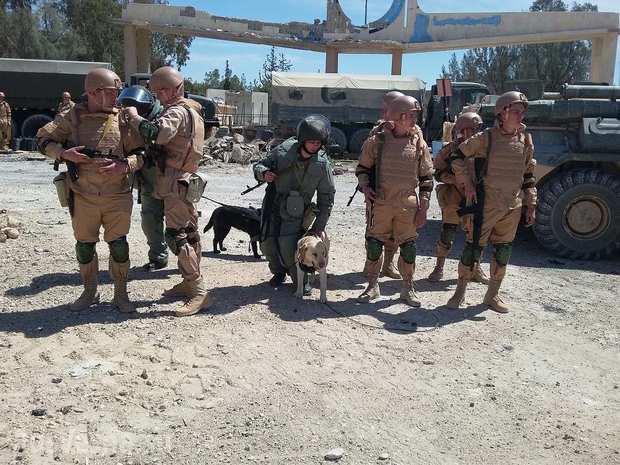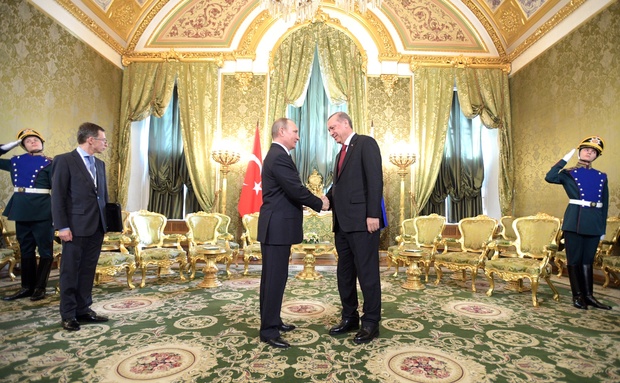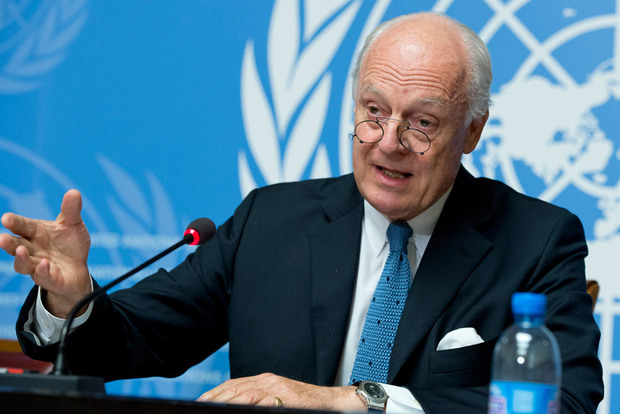Leonid Isaev: ''They understand it is necessary to divide Syria into influence areas to meet interests of Russia and Turkey''
Interview with the political expert in Arab studies about a symbolic return of Aleppo, meeting of Putin with Erdoğan and tough Iranian partner
News from Syria come about every day – occupation of a settlement by some party, attacks, statements of separate political leaders. The recapture of Palmyra and the exit of Assad's army to the territories controlled by Kurds became one of the most high-profile messages of the last days. A correspondent of Realnoe Vremya started to discuss the Syrian crisis with political expert Leonid Isaev with this news. The expert in Near East also told about Erdoğan's trump cards in Russian and Turkish negotiations, a difficult partner in the person of Iran and the post-war life in Syria.
Palmyra: only symbolic meaning
Leonid, Syrian forces defended Palmyra again. Probably nothing left from it. Why are the Assad's army and militias fighting for this city so furiously?
Symbolically, it is very important. You remember the importance that was given to the liberation of Palmyra in March last year. At that moment, it was presented like a symbol of the fight of Russia and Syria against the Islamic State (Editor's Note: ISIS is an organisation banned in Russia). Moreover, it was presented like prove of the effective fight of Russia and Syrian regime against the Islamic State and, in turn, the inefficiency of acts in the anti-terrorist operation of the coalition headed by the United States of America. This is why the liberation of Palmyra at the beginning of 2016 was accompanied by quite a powerful media campaign that Russian diplomats ran in UNESCO and Security Council. Security Council refused to accept the claim on it, though Russia insisted. This is why the loss of Palmyra we observed at the end of the last year got the same reaction, of course, only with a disadvantage for Russia. It was very important to liberate Palmyra again from the point of view of symbol and reputation.
Let's be honest, nowadays the Russian Federation together with the Syrian army is unlikely to boast about something except Palmyra in the fight against the Islamic State. With Nusra (Editor's Note: Jabhat al-Nusra is an organisation banned in Russia), with rebels – yes. As for the Islamic State, can we boast about tens of villages with a total population of two and a half people? It is natural that we wanted to return Palmyra. It was a matter of time. The only thing what made us postpone the attack and the recapture of this city is the uncertainty that the Syrian army will be able to defend it properly. The way Palmyra was ruined is on the Syrian army's conscience that managed to yield up without a fight while it had four times more people than the rival. Here it was not only important to capture it for the second time, which was not a problem, but keep it. It must not happen again, otherwise it would be a shame for our militaries.
In general, does the city have any importance? I heard many times that it is like a suitcase without a handle.
From a military perspective, no. It is only symbolic. When we occupied it for the first time, we said like Palmyra was to open the road to Raqqa. It is a crossing of roads and so on. Our militaries said different things. But did we see that anybody used it during 2016? Nobody moved beyond Palmyra. There is no strategic importance – all roads to Raqqa lead through other settlements. If we think it over, Palmyra is not even a city. It is just a complex included in the UNESCO World Heritage Site List. There is a village around it where the staff that worked in the complex and maintained all tourist infrastructure, etc. lived until 2011. It was interesting not just because we liberated Palmyra but because it is a world-scale value. If another city with similar dimensions, population like Palmyra were captured, it would not get such a reaction. It has a cultural and historical meaning, not military and strategic.

''If we think it over, Palmyra is not even a city. It is just a complex included in the UNESCO World Heritage Site List. There is a village around it where the staff that worked in the complex and maintained all tourist infrastructure, etc. lived until 2011. It was interesting not just because we liberated Palmyra but because it is a world-scale value.'' Photo: rusvesna.su
So, Palmyra was occupied. What will happen next? How will our allies act?
They will do nothing in this area. Palmyra will be protected. It is necessary to act in the north. The most interesting fighting is taking place there.
Trump cards in Erdoğan's pocket in Moscow
These days messages about erroneous hits of the Russian Aerospace Forces on the Syrian Arab Coalition and Turkish militants. Is it a coincidence? What are the possible consequences?
I don't think we deliberately attacked then. It will be too naïve to conduct such provocations considering the state of the Russian and Turkish relations. Now the Russian and Turkish presidents appreciate the Russian and Turkish relations and are not going to worsen them. This is why, on the contrary, Russia and Turkey are trying to avoid any provocations. This is why such incidents like our ambassador's murder in Ankara, hit of the Russian Aerospace Forces on Turkish militaries is what we want to avoid with the Turks. Such incidents are able to worsen the Russian and Turkish relations, slower their improvement. This is why I don't think it was done deliberately. It was likely to be an inefficient non-compliance and the next demonstration of slovenliness of Russian and Turkish militants. We have seen many examples of this kind of slovenliness of Russian and Turkish militaries. It was likely to be a non-compliance between Russian and Turkish militaries. But we try to change it. Our militaries are trying to coordinate military actions in Syria in Astana fields. And Erdoğan's recent visit was also accompanied by meetings of Russian and Turkish militaries. It was to help to prevent such incidents and act as one more because the price of mistake is very high. It happened once. But if it happens always, both sides will lose patience.

''They understand that Russia and Turkey are interested in reduction of conflicts on the north of Syria. And we are trying to help it.'' Photo: kremlin.ru
What are the results of the negotiations of Putin and Erdoğan in Moscow?
We confirmed the necessity to cooperate in all previous projects and renew the projects that were frozen when the Russian and Turkish relations became colder after the downed jet in November 2015. Because there is an agreement on Syria, and we act depending on a situation. There are certain short-term tasks that we perform. There is an idea of how we see the situation in the combat zone, how we would like it to develop and try to coordinate our actions somehow leaving principal but low-priority issues out at the moment like whether Assad should leave or not. They understand that Russia and Turkey are interested in reduction of conflicts on the north of Syria. And we are trying to help it. They understand that it is necessary to divide Syria into influence zone to meet interests of Russia and Turkey, and we are doing it. Yes, we act according to a situation. We understand how the situation should develop in the short term.
As far as I am concerned, this meeting of Putin and Erdoğan in Moscow was aimed to develop bilateral relations of Russia and Turkey because the Turkish side told many times and confirmed again that it is not satisfied about the slow development of the relations, so to speak. It would like to increase the cooperation between the countries, particularly in visa cancellation. In answer to it, Putin gave a positive answer to the Turks that this issue was solved a long time ago, it was necessary to arrange some bureaucratic and technical questions. It also would like to recover the economic cooperation and reach at least the level that was before the conflict. Agreements on two strategically important questions were reached — Akkuyu Nuclear Power Plant and gas pipe that is to cross Turkey to Europe. One pipe is to reach Europe, the other one – Turkish consumers. It was the first intergovernmental meeting at this level after the conflict. Now we recovered the relations. The next meeting will be held in Turkey this year, as Erdoğan stated, was one of the results.
Turks had quite a good situation. After Manbidj was given to Syrians almost having prevented Turks from occupying this city because it belonged to Kurds, and Turks were going to go to war against Kurds, Turks are unlikely to fights against Syrians supported by Russia. This is why it was not a good act towards Turks. In addition, Turkish soldiers who died by mistake. It all created a situation where Russia became a debtor of Turkey. Turks actively required to recover the Russia and Turkish economic relations and abolish visa regime. It all created a pleasant atmosphere before the negotiations for Turks. In this respect, our president agreed with the Turks.
Talks on Syria took place in Geneva and Astana. Is there any chance of following the agreements?
Astana is rather a forum to discuss some technical military issues linked with the ceasefire regime because Russia, Turkey and Iran are a guarantee of this regime. And they need the meetings in Astana to coordinate their actions at least at a military level. Geneva did not have any result because de Mistura (Editor's Note: Staffan de Mistura is a United Nations special envoy for the Syria crisis) initially said that Geneva's goal was to define the agenda and create a timetable of the next meetings where we need to negotiate on the topic. It was created. The next round of Geneva is to take place in March. In this respect, probably there are no breakthroughs, but everything is done gradually in due course.

''Geneva did not have any result because de Mistura initially said that Geneva's goal was to define the agenda and create a timetable of the next meetings.'' Photo: un.org
Syria's post-war future
Some experts say that relations between Moscow and Tehran have worsened.
There is not any union between Russia and Iran. There are similar views on many issues. All these talks about some union between Russia and Iran come from similar views on a majority of issues on the happening events. But if we start to go into details, disagreements start to appear. We agree that Assad is a single president, intervention, anti-terrorist campaign, etc. As soon as we start talking about the keynote of the Syrian issue, there are more disagreements. Yes, we have similar estimations of the Yemen problem, Syrian problem, intervention of Americans to Iraq, Arab revolutions. Iran is a tough partner for us. It is very difficult to have negotiations with them. It seems that we have good relations. But we don't show many problematic issues, we don't make them public. There is offence towards each other. Iran is a tough partner we would not like to lose as well as Iran would not like to lose Russia. At times we find it difficult to have a consensual position. But it is not a reason to break relations with Iran. No, we won't. Anyway, we supported Iran in the Viennese deal on the Iranian Nuclear Programme before, we also made our contribution. We are not interested in conflict with Iranians, every partner is priceless for us. I don't think that Russia will be ready to drop Iran for the sake of good relations with Turks.
Leonid, do you believe that the civil war in Syria will end? Who will win?
Nobody wins in a civil war. It will end, at least the intense phase of military actions. Maybe we will see it this year. But the national reconciliation and agreement needs at least trust of all fighting parties, and it can't appear in a flash. It takes time. I don't know whether they will come to an agreement, whether Syria will conserve its borders. But I think it is possible that the civil war can end from a perspective of ceasefire. At least we can divide the country into influence areas, it is what Russia, Turkey, Iran and the West are doing now. It is what will allow us to cease fire in Syria. It doesn't mean the civil conflict between different fighting groups will end. More than six years of sanguinary battle don't pass without leaving a trace. It is not clear the parties will sit down for the talks. Syria will be a kind of territorial entity where quite independent political entities like Kurds, Idlib, the South live… They will exist quite autonomously…
Like in Somali?
Yes. Though Somaliland announced it is an independent state, here nobody will announce its independence. It will be a single state. Everybody will admit they are part of Syria. Everybody will want an agreement but exist separately from each other having their own armed forces, game rules on every territory. We will probably see it in the future. At least, nobody offers another solution. We, in turn, think it is better than a civil war. Then we will see.